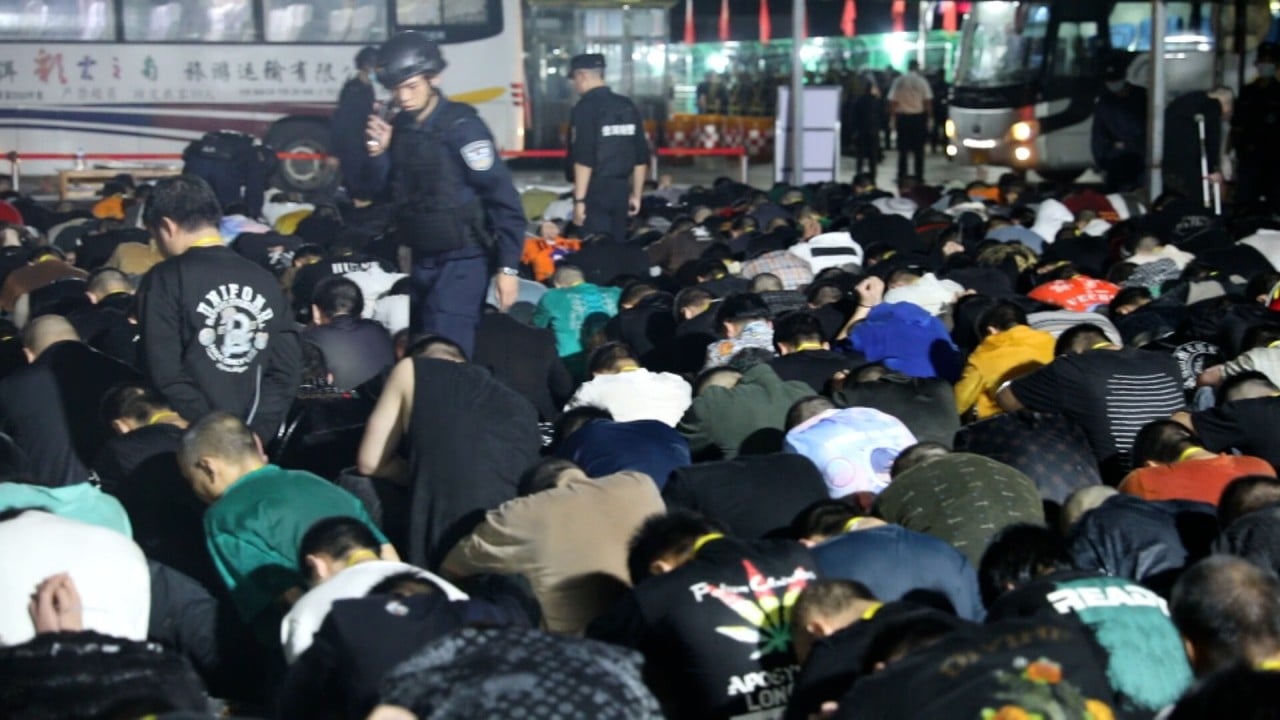
Chinese navy visits Myanmar in ‘show of friendship’ following upsurge in fighting along border
- The visit, which will include joint naval security exercises, comes as armed rebel groups have taken over a series of key locations along the border
- The militias reportedly helped a recent crackdown on cybercrime in the region, prompting speculation Beijing may change its Myanmar strategy
The Chinese delegation will take part in “professional exchanges, cultural and sports competitions, and mutual visits to military facilities with officers and sailors of the Myanmar Navy”, according to the report.
A spokesman for the ruling junta Zaw Min Tun confirmed that the two warships and a supply vessel, carrying more than 700 sailors between them, had arrived at Thilawa port on Monday ahead of “naval security exercises between Myanmar and China”, according to the Global New Light of Myanmar newspaper.
He did not give further information about the exercises, but said the visit reflected the “strong friendship” between the two militaries.
It is the first Chinese naval visit to the country since 2017.
Could Myanmar’s military be deposed by armed groups fighting across the country?
Fan Hongwei, a specialist in China-Myanmar relations at Xiamen University, said the visit “indicates that military exchanges between China and Myanmar have not been affected by the situation in the north [of Myanmar]”.
The visit coincides with an upsurge in fighting close to the Chinese border in Shan state between the junta and the Three Brotherhood alliance, made up of armed groups representing ethnic minorities. The militia groups have taken over a number of crucial trade hubs since launching an offensive last month.
Reports that the rebel groups have been helping to close cybercrime bases have heightened speculation that Beijing may adjust its approach and put even greater pressure on the junta if its fails to put a stop to cross-border telecoms scams.
Yin Yihang, a fellow with Beijing-based think tank the Taihe Institute, said violence in the border regions could create further uncertainty in relations between the two countries.
“Any suggestions by China could be seen as interference in Myanmar’s internal affairs and create a backlash from the people in Myanmar,” Yin said. “So China needs to tread very carefully to avoid being drawn into the domestic conflicts in Myanmar.”
Yin said the crackdown on fraudsters was a question of law and order rather than security, and said it was unclear how much influence Beijing had over the armed rebel groups.
“That’s why China started live-fire drills at the border regions, which is not just a warning to the military government but also to the rebel groups that their conflicts should not jeopardise peace and stable bilateral ties.”
UN says Myanmar imported US$1 billion in arms from China, others since coup
In a rare demonstration in Yangon last week, protesters gathered in front of the Chinese embassy, accusing Beijing of backing the armed groups.
Sun Yun, a senior fellow at Washington’s Stimson Centre, said: “It is better for the bilateral relations that the cyber scams are pushed out by the ethnic rebels rather than a solution imposed by China.
“For China to push harder may not bring a solution but bring more stress to the bilateral ties.”
Sun said it was unlikely Beijing would change its strategy in Myanmar and the crackdown highlighted its influence.
“In fact, the fact that China has spent so much time and efforts to persuade the military government to cooperate with China on the cyber scams is a good example of China’s approach, which may appear to many Chinese as too tolerant,” she said.
“I don’t think China is aiming to alter the political reality in Myanmar today, but I do think China aims at protecting itself from cyber scams.”

Fan said China would continue to push for peace talks in Myanmar.
“Both the internal conflicts and the telecoms scam have demonstrated that China is a direct victim of the instability and unrest in Myanmar,” Fan said.
“Only when peace, stability and development are achieved in Myanmar, can Chinese investment in Myanmar and cooperation between the two sides really move forward.”


